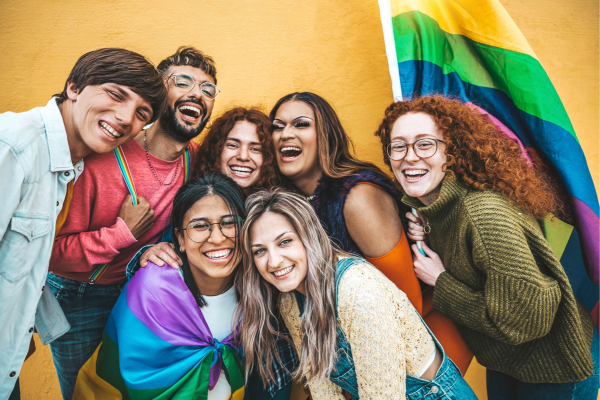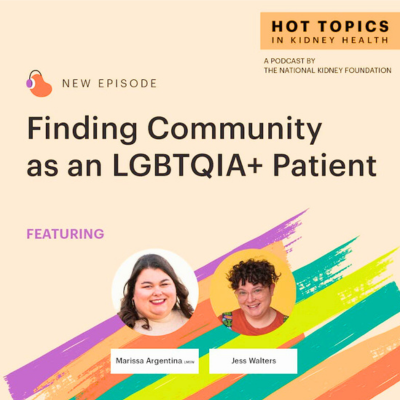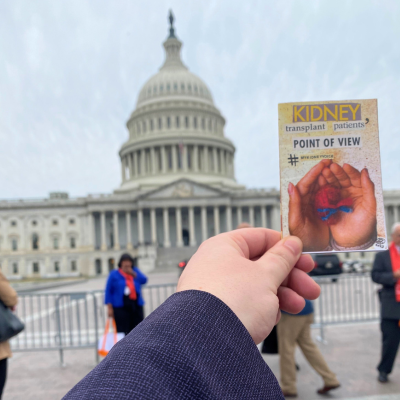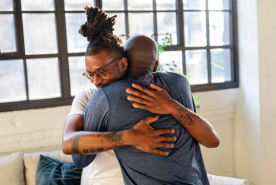June 12, 2025
No one should face health care delays because of who they are. Learn how bias impacts LGBTQIA+ kidney patients and where to find inclusive support.
What does feeling truly seen and supported mean in your health care? For many LGBTQIA+ people with kidney disease, the answer isn’t simple.
Jess Walters is a mixed-media artist, Board Certified Patient Advocate, and independent scholar living with a kidney transplant. Marissa is the Patient Programs Director at the National Kidney Foundation (NKF) and a social worker working to make kidney care more inclusive. Together, they share what supportive care and community look like and why they matter.
When Jess legally changed their name after coming out, they expected paperwork challenges.
They didn’t expect it would stop them from getting the medicine they need to protect their kidney transplant.
“I changed my name everywhere except my Social Security card, because they don’t allow nonbinary options,” Jess said. “The next time I went to the pharmacy, my name didn’t match their records. The pharmacist refused to give me my medications.”
Jess knew that missing even one dose of anti-rejection medication could put a transplant in danger.
“My doctor resolved the issue that day, but not everyone is so lucky,” Jess said. “My doctor’s advocacy is an exception, not the rule.”
Jess also experiences constant misgendering from check-in, with nurses, and technicians.
“It’s a constant barrage of ‘I don’t see you,’” Jess said. “As a transplant recipient, I’m frequently in clinics. It affects my mental health, which impacts my physical health.”
Stress can raise blood pressure, which can damage the kidneys.
And that’s not even factoring in the anxiety of wondering whether their gender identity might one day disqualify them from a second transplant.
“There’s a chance I’ll need a new kidney someday,” Jess said. “Some clinicians believe that gender dysphoria makes you ineligible. A biased individual could cost me my life.”
Jess’s experience opened their eyes to the other inequalities in the healthcare system.
“The healthcare system doesn’t work for everyone equally—not just for LGBTQIA+ people, but for anyone with a marginalized identity. Whether it’s your race, gender, orientation, religion, housing, or job status—it can affect the care you get and whether you get it at all.”
The Importance of Community
Jess was diagnosed with Alport syndrome, a rare genetic disorder that affects the kidneys, hearing, and eyes, when they were 16.
“My doctor told me I’d likely never meet another person living with Alport Syndrome, Jess said. “I felt destined to go through my journey alone.”
Years later, a simple Google search led them to the Alport Syndrome Foundation.
“I met other patients online. Then I went to Italy in 2019 to meet Alport patients from all over the world in person,” Jess said. “Now, I have friends in the UK, Greece, China, and more.”
That experience changed Jess’s life in the best way. But finding a space that embraced all of their identities was harder.
“It’s rare to find a queer disabled kidney community,” Jess said. “But you can get little doses of different communities in different spaces.”
For Jess, those doses come from online groups, nonprofits like NKF, and art spaces in Charlottesville where they create zines, small handmade magazines, by and for women, nonbinary, and gender-diverse artists.
Jess is especially known for their zines in NKF's Voices for Kidney Health advocacy community.
“I bring zines to NKF Patient Summits to share my kidney story and connect it to our legislative asks,” Jess said. “When I hand one to someone, it’s my way of saying, ‘You belong here.’”
How Healthcare Providers Can Help
Inclusive kidney care starts with a mindset: every patient is an expert in their own life.
“It’s our job to see the whole person, not just the kidney issue,” Marissa said. “We bring the medical knowledge, but they bring their lived experience.”
That starts by:
- Asking about their support system, work, and identity.
- Using their correct name and pronouns.
- Listening without judgment.
But real change takes more than one conversation. It takes action at every level.
“When I was a dialysis social worker, I heard feedback from LGBT patients about how staff treated them,” Marissa said. “It’s important to bring these issues to leadership and ask for a broader discussion about gender identity or sexual orientation and how we’re approaching care.”
To build more inclusive kidney care spaces:
- Honor names and pronouns: Ensure intake forms and patient portals allow people to mark their identity. Ask and use the name and pronouns a person tells you to use.
- Educate staff: Regularly train front desk staff, nurses, technicians, and clinicians on inclusive practices, including cultural humility, trauma-informed care, and LGBTQ+ health basics.
- Advocate internally: Push your workplace to rethink policies that may harm or delay care, especially for trans and nonbinary patients.
“Healthcare practitioners live by the phrase, ‘do no harm,’” Marissa said. “That means more than just physical harm. It’s about ensuring people feel mentally, emotionally, and socially safe. That has to start the moment someone walks through your doors.”
Subscribe today!
Join the NKF Blog Newsletter
Get inspirational stories and kidney disease resources delivered to your inbox every month. You'll gain practical insights and expert advice to help you better understand and manage your kidney health, no matter where you are on your kidney journey.
Where to Find an LGBTQIA+ Kidney Community
Jess knows how lonely navigating kidney disease can be. They encourage others who feel alone to start by researching their condition online.
“Get involved with the nonprofit organizations in that space,” Jess said. “Reach out to authors who’ve written about their experience. Those messages light up my day—and I know I’m not the only one.”
You can also join NKF’s LGBTQIA+ Kidney Community.
“It is a safe, anonymous space committed to sharing accurate information,” Marissa said. “I hope people feel empowered to go there and build their own communities. Even messages like ‘this helped me’ can be powerful.”
NKF Peers is another option for those looking for a one-on-one connection.
“We don’t always have the answers, but others in the community might,” Marissa said. That shared experience is so valuable. It helps people figure out how to navigate conversations with their healthcare teams.”
And for anyone out there who feels alone, Jess has one more message:
“If you don’t have community and you’re reading this, hit me up on Instagram @jesswaltersart. I’ll be your community.”




















